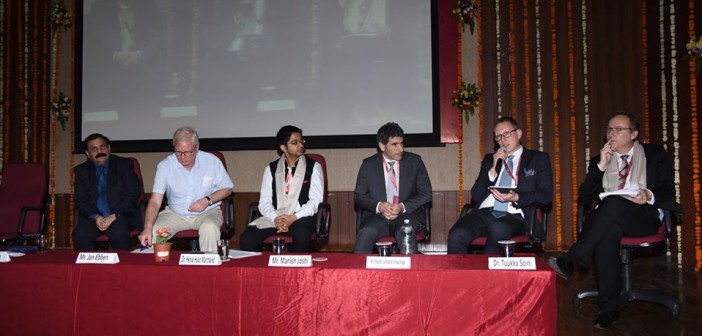The second day of PSSCIVE National Conference began with a keynote session on TVET Excellence and Innovation. The technical session elaborated on the strategies adopted and action taken by the UNEVOC Centers to increase the opportunities for productive work, sustainable livelihoods, personal empowerment and socio-economic development.
To capture the essence of the presentations, Team NSN presents snapshot of the keynote session on TVET Excellence and Innovation
Mr. Rikardo Lamadrid Intxaurraga, Director, Technology and Advanced Learning, Basque Government, Spain (UNEVOC Network Member)
Delivering his keynote on the topic Matching Skills with Needs Based in the Basque RIS, Mr. Rikardo Lamadrid Intxaurraga, Director, Technology and Advanced Learning, Basque Government, Spain (UNEVOC Network Member) said, ” Vocational excellence is a new policy concept that aims to maximize the contribution of VET to innovation and initiative on Centre of Vocational Excellence (CoVE), the concept needs a wider application to be more effective. The Basque Vet Plan is based on the Basque Research and Innovation Smart Specialization Strategy.”
Dr. Tuukka Soini, Chief Development Officer, Joint Authority of Education in Espoo Region Omnia Vocational College, Finland (UNEVOC Network Member)
“Vocational education offers opportunities for everyone. The curriculum is designed and updated with the help of the industry. The education and training is done with partnership with private sectors. It creates networks for students so they get employed and get relevant contacts in businesses. We have competency based evaluation, so they evaluate what their skills really are based on criteria. It is strongly contributing towards sustainable development goals. It will lead to a sustainable future, including lifelong learning, partnerships and sustainability”, said Dr. Tuukka Soini, Chief Development Officer, and Joint Authority of Education in Espoo Region Omnia Vocational College, Finland (UNEVOC Network Member)
 Mr. Manish Joshi, TVET and Higher Education Specialist, UNESCO, New Delhi, India.
Mr. Manish Joshi, TVET and Higher Education Specialist, UNESCO, New Delhi, India.
“Through capacity building, we are aiming to organize a TVET leadership program, which is a global format, that UNESCO-UNEVOC has created and our job is to bring it to South Asia and work with the change makers. We want to contextualize the program for South Asia and use this as a tool to build capacity of the TVET leaders. Through this we are aiming to foster TVET excellence. We will use the cross learning platform to push more and really enable countries to learn from each other.” said Mr. Manish Joshi, TVET and Higher Education Specialist, UNESCO, New Delhi, India.
Mr. Jan Ebben, Consultant, National Skill Development Corporation, New Delhi
Delivering his thoughts on Dual Studies and B.Voc.: A Comparison of Innovative Initiatives in Germany and India and their Potential for Making TVET Viable for the Future, Mr. Jan Ebben, Consultant, National Skill Development Corporation, New Delhi, India said, “ an industry-driven initiative has transformed TVET and higher education alike. Today, there are more than 30,000 students enrolled on 12 campuses. The introduction of B.Voc. In 2014 had similar goals. However so far has not fulfilled all expectations. In India, in 2018-19, a total of 3263 students enrolled in over 200 universities and colleges.”












